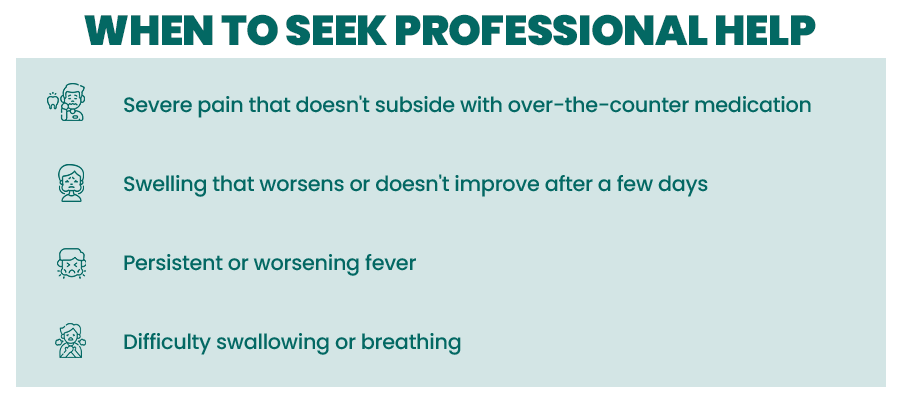Root canal treatment is a common dental procedure that aims to alleviate pain and prevent further complications caused by an infected or inflamed tooth pulp. While the treatment itself is designed to eliminate the source of the pain, it’s normal to experience some discomfort or mild pain after the procedure.
This blog post will guide you through the steps you can take to manage pain after root canal treatment and ensure a smooth recovery.
Understanding Root Canal Pain
During a root canal treatment, the infected or inflamed pulp (the soft inner tissue of the tooth) is removed, and the inside of the tooth is cleaned, disinfected, and sealed. This process can cause some swelling and soreness in the surrounding area, leading to root canal pain after the treatment.
Immediately After the Procedure
Immediately after your root canal treatment, you may experience some tenderness or mild discomfort in the treated area. This is a normal reaction as your body adjusts to the procedure. Here are some tips to help manage the pain:
- Take Over-the-counter Pain Medication: Your dentist may recommend taking an over-the-counter pain medication, such as ibuprofen or acetaminophen, to alleviate any discomfort. Follow the instructions on the label and consult your dentist if you have any concerns.
- Apply Cold Compresses: Applying a cold compress or an ice pack wrapped in a thin towel to the affected area can help reduce swelling and numb the pain. Use it for 10-15 minutes at a time, several times a day.
- Avoid Hard or Crunchy Foods: Stick to soft, easy-to-chew foods for the first few days to prevent irritation or pressure on the treated tooth.
Managing Pain in the Days After
While the initial discomfort may subside within a day or two, some individuals may experience lingering pain or sensitivity for a few days after the root canal treatment. Here are some strategies that can help you with root canal pain relief:
- Continue Taking Over-the-Counter Pain Medication: If you’re still experiencing pain or discomfort, continue taking the recommended over-the-counter medication as directed by your dentist.
- Use Salt Water Rinses: Rinsing your mouth with warm salt water can help reduce inflammation and promote healing. Mix 1/2 teaspoon of salt in a cup of warm water and gently swish it around your mouth.
- Apply a Cold Compress: If you’re still experiencing swelling or discomfort, continue applying a cold compress or ice pack to the affected area for short periods.
How to Treat Root Canal Pain at Home
In addition to the tips mentioned above, there are some home remedies that can help alleviate root canal pain at home:
- Clove Oil: Clove oil has natural pain-relieving and anti-inflammatory properties. Soak a cotton ball in clove oil and gently apply it to the affected area for temporary relief.
- Garlic: Garlic has natural antibacterial and anti-inflammatory properties. You can chew a clove of garlic or make a paste by crushing a few cloves and applying it to the affected area.
- Tea Bags: Black tea contains tannins that can help reduce inflammation and swelling. Apply a warm, damp tea bag to the affected area for 10-15 minutes.
When to Seek Professional Help
While some discomfort is expected after a root canal treatment, severe or persistent pain may indicate a complication or an underlying issue. If you experience any of the following, contact your dentist immediately:

Remember, proper follow-up care and adhering to your dentist’s instructions are crucial for a successful recovery after a root canal treatment. If you have any concerns or questions, don’t hesitate to contact your dental professional.
At IVY League Dental, we have an expert team of dentists who can help you with relief. Book an appointment today to know more.
FAQs
How long does pain usually last after a root canal?
Most people experience some degree of pain or discomfort for a few days after a root canal procedure. This is normal and results from inflammation in the area. The pain should gradually subside within 3-5 days. If severe pain persists for more than a week, you should contact your dentist.
What over-the-counter medication can I take for root canal pain?
Your dentist may recommend taking ibuprofen (Advil, Motrin) or acetaminophen (Tylenol) to help relieve pain and inflammation after a root canal. Follow the dosage instructions on the bottle carefully.
Is it normal to have some swelling after a root canal?
Yes, it’s common to experience some swelling in the area around the treated tooth for a few days after the procedure. Applying a cold compress to the area can help reduce swelling. However, if swelling worsens or persists for more than 5 days, contact your dentist.
What home remedies can help with root canal pain?
Some home remedies that may provide temporary relief include clove oil applied with a cotton ball to the area, chewing a garlic clove, or holding a warm tea bag against the painful area. However, be sure to check with your dentist before trying any home remedies.
When should I call my dentist about root canal pain?
Call your dentist right away if you experience severe, persistent pain that doesn’t respond to medication, swelling that worsens after a few days or signs of infection like fever or difficulty swallowing. These could indicate a complication that requires professional treatment.
